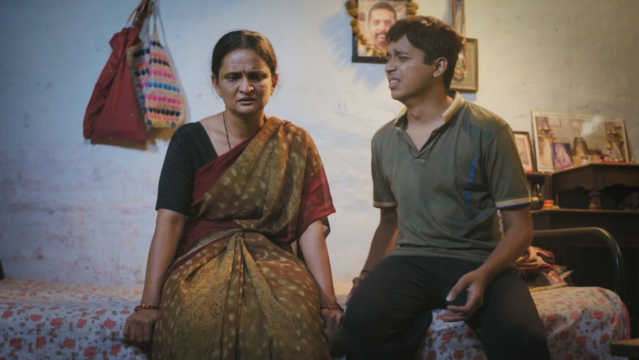
Blessy Chettiar
Mumbai, 03 Aug 2018 6:00 IST
While an honest attempt has been made to pack in a lot, it often ends in a hotchpotch of ideas scurrying for the viewers’ attention.

Indian mythology has vimaans, or aircraft, carrying the gods flitting about abundantly. One of them is the god of wealth Kuber's Pushpak Vimana, shaped like an eagle, from which this Marathi film gets its name.
Unfortunately, the protagonist in the film Pushpak Vimaan has his own ideas of airplanes, rooted in mythology and the tradition of the spoken word.
Kirtankar (singer of devotional songs) Tatya (Mohan Joshi) has never seen an aeroplane up close. His limited belief is that flying objects were created by the Hindu deity Panduranga and one of them (the Pushpak) was sent to receive Sant Tukaram as he ascended to Vaikunth, lord Vishnu’s abode.
During one such kirtan, his grandson Vilas tells Tatya that he learnt in school that the Wright brothers invented the aeroplane and not Panduranga. Tatya dismisses his claim and carries on singing, mesmerizing his audiences.
The story progresses in non-linear fashion, alternating between the past and the present with no clear demarcation. However, the editing is smooth enough and a discerning viewer can easily identify what is happening.
Tatya, now an old man, lives alone in a village in Jalgaon, longing to see his only living kin, Vilas. The aspirational Vilas (Subodh Bhave) has migrated to Mumbai for financial reasons. Tatya, who is respected and loved by everyone, is at the mercy of his neighbours, often fooling them into believing that he is forgetful.
When he falls ill one day, Vilas returns to the village and insists that Tatya go with him to Mumbai. The grumpy old man has umpteen reasons to hate “gandipatak” (filthy) Mumbai, while Vilas keeps telling him why the city is “super kadak” [very good].
However, a chance encounter with an aeroplane flying overhead changes Tatya’s opinion about the city. He starts hallucinating that Sant Tukaram wants him to travel in the Pushpak Vimana and sing kirtans for a glimpse of the lord Panduranga.
The entire second half is taken to reveal Tatya’s obsession with his hallucinations. Among many things, the film is about Vilas, his wife Smita (Gauri Kiran) and their neighbours’ efforts to make Tatya’s dream come true.

The relationship between grandfather and grandson is one of the major themes of Pushpak Vimaan. It is a fresh story and a sincere attempt, but the long-winding narration distracts you from the main theme (which keeps changing every few minutes).
Sometimes the makers themselves seem confused what the film is about — is it the grandpa-grandson relationship, the never-ending rural-urban debate, the sensitivity needed to deal with senior citizens, or a case for Tuka-worship?
While an honest attempt is made to pack in all these in a quest for coherence, it often ends in a hotchpotch of ideas scurrying for the viewers’ attention. The regional Khandesh versus Konkan forced references are used indiscriminately to evoke laughter but fall flat almost always.
Bhave plays an important role in a story he wrote, and he is convincing, too. He shares the direction credit with Vaibhav Chinchalkar. Chinchalkar has also written the screenplay along with Chetan Saindane, while the dialogues are by Milind Shinde. This vimana certainly seems to have had too many pilots, taking it in different directions, leaving the viewer restless in the bargain.
However, the veteran Mohan Joshi proves his mettle. He is brilliant in every scene, often displaying childlike innocence and quickly changing into a peeved old man no one wants around. He entertains ably in a leading role but suffers from the script’s lack of focus. It is a delight to watch him, especially in the sequences where he stretches his arms out, à la Shah Rukh Khan, to be frisked at security points. Gauri Kiran, who makes her debut in the film, has good screen presence.

Most of the songs are based on Tukaram’s abhangas and heavy on devotion, except ‘Mumbai’, which uses the prominent sights of the Maximum City effectively to talk about its dichotomous character. ‘Lagbag Lagbag’ uses the city’s sounds to create a fun number.
Maybe if the makers had focused on just Tatya’s story, Pushpak Vimaan would have made for a compelling, heartwarming watch. Dragging poor Mumbai and its filth everywhere backfires badly.
In Pushpak Vimaan, the grandson becomes a vimana to give flight to his grandfather’s fantasies that are rooted in mythology and devotion. However, as one of the songs goes: 'Aata nako vell kaadhu, aata dheer nahi [Don’t waste any more time, I have no patience]', the audience runs out of dheer by the time this flight is ready to take off.
You might also like

Review Marathi
Samaira review: This well-intentioned travel drama suffers from a dull script
Actor Rishi Deshpande's directorial debut doesn't rise as much as its performances. ...

Review Marathi
Goshta Arjunchi review: Triggering conversations about mental health
Anupam Barve’s short film urges people to talk to their families about what they are going...

Review Marathi
Ekda Kaay Zala review: Sumeet Raghvan impresses in a film that does not use its full potential
Directed by Dr Saleel Kulkarni, the film has a fine act by child artiste Arjun Purnapatre....

